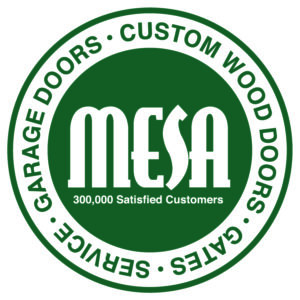Tips for Lubing a Garage Door
Garage doors can become noisy and sluggish if you don’t lubricate them. Increased friction can contribute to overall wear and tear as well. To maintain your garage door and reduce the strain on the motor, lubricate moving parts every six months. You can avoid costly repairs, accidents, and premature replacement by following these tips for lubing your garage door:
Prepare to Lubricate Your Garage Door
Before lubricating your garage door system, perform some general maintenance tasks to make sure everything is in working order. Here’s what you need to do:
- Tighten Loose Parts: Look for loose nuts and bolts and tighten them. Be careful not to overtighten anything and, if something looks excessively worn, replace it or call a garage door technician.
- Check/Clean the Rollers: Roller bearings are often unsealed and can collect dirt. Clean them if necessary; if a roller is worn out and wobbling in the track, replace it.
- Inspect the Hinges: Noisy hinges are usually ones that have gone bad. A bad hinge can cause your garage door to get stuck, so it should be fixed/replaced before proceeding.
- Adjust the Chain: Tighten the garage door opener’s chain if it’s loose, making slapping noises, or also causing the garage door to jerk when moving.
How to Properly Lube a Garage Door
To start, all you need is a store-bought garage door lubricating oil. Have a cleaning rag, an old outfit, a face mask, and gloves/goggles handy. Protective gear will shield you from dirt, allergens, and irritants. Close the garage door and shut off the power to the opener. Then follow these steps:.
- Clean the Tracks: Use a damp rag to wipe the inside and outside of the garage door tracks. Make sure to remove all dirt and debris. Avoid using lubricant directly on the tracks, as it will strain the rollers and garage door opener. For tiny crevices, use a vacuum cleaner with a small attachment; stubborn dirt can be removed with an automotive brake cleaner.
It’s also a good idea to quickly wipe down the interior and exterior of the garage door.
Next, proceed with applying lubricant to the:
- Hinges: Open the garage door and lubricate each hinge, one at a time. Place the lubricant where each hinge contacts the bend in the track.
- Rollers: Aside from nylon rollers which should never be lubricated, a garage door roller should be thoroughly lubricated, including its internal ball bearings. Too much lubricant can cause the door to be unbalanced, so wipe the excess away.
- Springs and Bearing Plates: These components are located at the top of the garage door, so you may need a step ladder; once the compound is applied, slowly open and close the door manually to distribute the lubricant. Apply more if the springs are noisy
- Armbar and Lock: If these are present, apply lubricant to prevent rust from forming. The compound protects these parts from harsh elements. Also, apply lubricant directly into the keyhole.
- Garage Door Opener Rail: Grease the top of the rail on which the opener’s chain rides. Apply the lubricant and spread it with a clean rag. Do not put oil directly on the chain; it is already pre-lubricated. Spraying the bottom of the rail is not necessary.
Use the Right Lubricant
When lubing a garage door, use an all-weather product as cold temperatures can cause some lubricants to thicken and increase wear on parts. Silicone sprays have a straw attachment to reach small parts. White lithium grease is effective as well. However, it’s applied by hand so it can be messier, but it is easy to spread around. Mechanic grease, engine oil, and WD-40 or other standard degreasers can collect dirt and dust, so are not suited for lubing garage doors.
Call Mesa For Garage Door Repair
Lubricating your garage door is simple, but contact us if any part of your garage door system appears damaged. We specialize in the installation and repair of all types of garage doors. Get more tips and answers to frequently asked questions or request a free garage door repair quote online. To speak with us directly, call (714) 364-4987 now.




